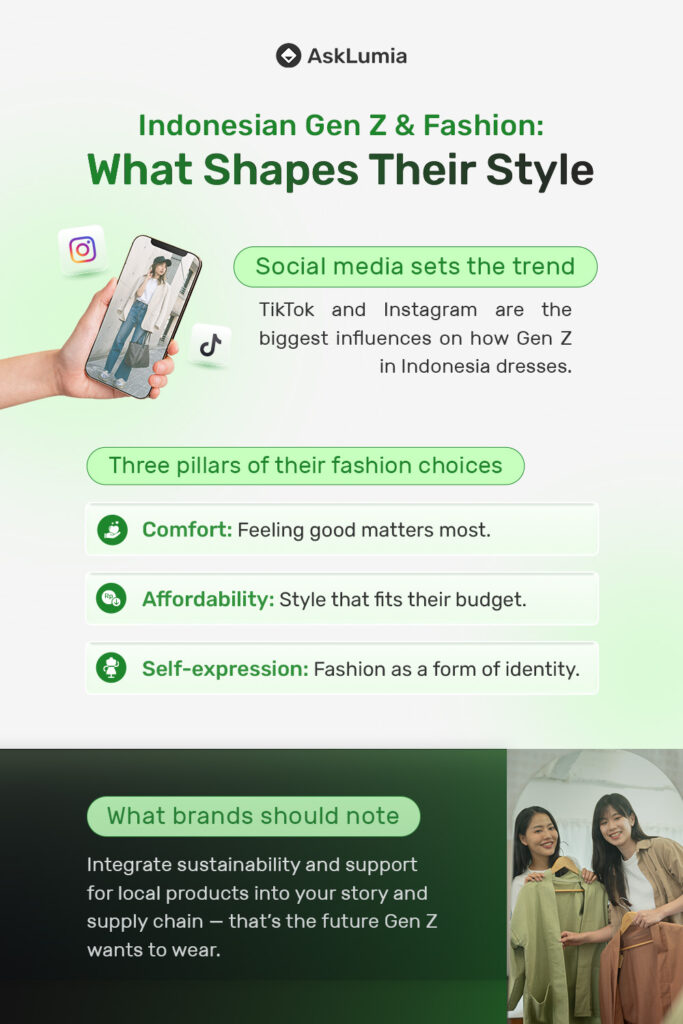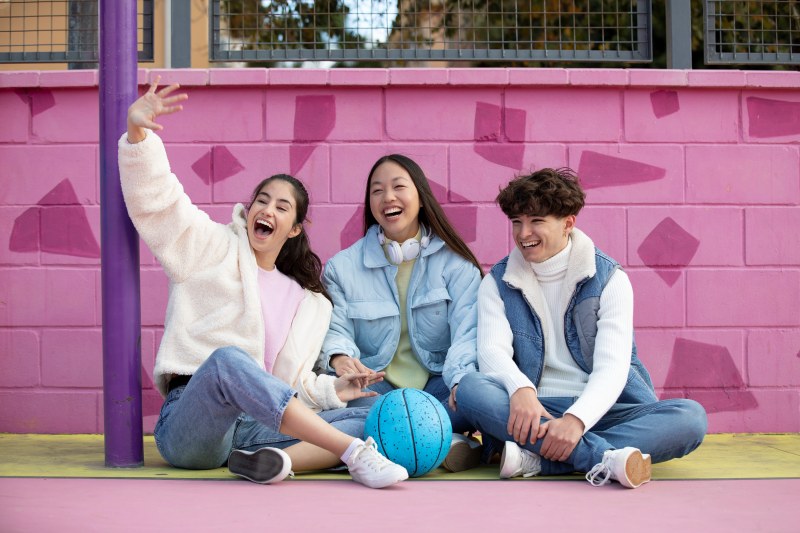Gen Z is becoming the most influential generation today, and this has put them in the spotlight, including how they select fashion products for their everyday wear.
Their decision-making process is often not driven by a single factor. Digital influences social media, personal preferences, ethical values, and other considerations, all play a role in shaping their choices. These factors also influence their habits when choosing fashion products for daily use.
To understand how Gen Z in Indonesia selects fashion products for their everyday wear, we conducted research through AskLumia.
How does Indonesian Gen Z Fashion Product Selection Work?

Start by writing a prompt for the research topic you’re curious about. And for today’s topic, we’ll start by creating a simple prompt: “I need to understand the criteria Gen Z in Indonesia uses to select fashion products for their everyday wear.”
Core Research Finding
To address the question of the fashion selection criteria for Indonesian Gen Z, AskLumia reveals several critical insights. The findings indicate a consumer group that is deeply embedded in the digital world, highly practical in their purchasing habits, and increasingly driven by a strong set of personal and ethical values.
- Indonesian Gen Z’s fashion choices are overwhelmingly shaped by social media, particularly TikTok and Instagram, which serve as their primary channels for trend discovery and inspiration. Their trust is placed in authentic and relatable influencers who champion affordability and modesty, and the opinions of their peers are often more impactful than traditional advertising. This digital ecosystem is the main arena where fashion brands are discovered and purchase decisions are heavily influenced.
- Despite being highly aware of trends, the most critical factors in the final purchase decision for Indonesian Gen Z are practical: affordability and comfort are consistently ranked as top priorities. Beyond these functional needs, fashion is viewed as a vital tool for self-expression and reinforcing personal identity. Consequently, uniqueness and quality often take precedence over brand recognition, as consumers seek items that reflect their individual values and personality.
- There is a significant and growing preference for sustainable fashion and local Indonesian brands among Gen Z consumers. This trend is motivated by a desire to support the local economy, a connection to cultural relevance, and an increasing awareness of ethical and environmental issues. While factors like higher costs and limited availability can be barriers, the underlying interest in making more conscious purchasing decisions is a defining characteristic of this generation.
Top-Line Recommendations about Indonesian Gen Z Fashion Product
Based on the core findings, when you conduct research with AskLumia, it has also developed a set of strategic recommendations to guide your approach.
These actions are designed to help fashion brands authentically connect with Indonesian Gen Z by aligning product, marketing, and brand strategy with their primary decision-making drivers.
1. Authenticity and Community as the Heart of Social Strategy
Brands must develop a hyper-targeted social media strategy centered on authenticity and community engagement. This involves prioritizing collaborations with micro-influencers on TikTok and Instagram who genuinely align with values like affordability and relatability.
Furthermore, fostering user-generated content campaigns and building online communities can effectively leverage the powerful influence of peer-to-peer recommendations and create a more organic brand presence.
2. Comfort, Affordability, and Self-Expression Drive Product Appeal
Product development and marketing messages must be centered on the core pillars of comfort, accessible pricing, and self-expression. Brands should ensure their pricing strategy aligns with the budget-conscious nature of this demographic while clearly communicating the comfort and quality of materials.
Marketing narratives should frame fashion items not just as clothing, but as essential tools for building personal identity and creativity in their everyday lives.
3. Sustainability and Local Pride Strengthen Brand Trust
It is crucial to integrate sustainability and support for localism into the core brand narrative and supply chain. Brands should practice transparency regarding their production processes and material sourcing to build trust and justify value.
Championing local designs, collaborating with local artisans, and highlighting cultural heritage can create a powerful point of differentiation and foster a deep, meaningful connection with this socially-conscious demographic.
The Digital Thread: Decoding Indonesian Gen Z’s Fashion Criteria

Indonesian Gen Z’s fashion behavior is primarily influenced by authentic social media trends and peer recommendations, underscoring the importance of brand strategies that emphasize relatability and community engagement.
Platforms such as TikTok and Instagram have become the main avenues for fashion discovery, with influencer content and viral trends significantly shaping brand perception and purchase intent.
While Gen Z actively follows digital trends, their final purchase decisions are guided by a combination of practical and emotional factors.
Affordability and comfort remain dominant considerations, while a growing preference for local brands reflects their appreciation for cultural relevance and support for the domestic economy.
Nonetheless, external studies indicate that many still favor international brands, suggesting a gap between expressed values and actual buying behavior.
Moreover, sustainability continues to emerge as a meaningful but secondary factor, as higher costs and limited product availability remain key barriers to adoption.
How to Win the Indonesian Gen Z Fashion Market? Comfort, Cost, and Identity Are the Keys!

Indonesian Gen Z’s fashion choices are driven by three key pillars: comfort, affordability, and self-expression. While social media platforms like TikTok and Instagram heavily shape their style inspiration, practical considerations such as budget and comfort ultimately influence their purchasing decisions.
Research results conducted by AskLumia show that Gen Z values functionality, such as fabric quality and fit, just as much as style, viewing fashion as a way to express identity rather than merely follow trends.
They increasingly favor local brands that reflect cultural relevance and personal values, even as global brands continue to hold strong appeal. To resonate with this demographic, fashion brands must balance trendiness with practicality, while marketing should emphasize authenticity, individuality, and the story behind each piece.
These are the findings from AskLumia’s research on how Indonesian Gen Z perceives fashion products. The report not only presents key insights but also offers actionable recommendations that can inform strategic decisions in this area.
Experience how easy it is to conduct research with AskLumia, an AI-driven insight platform. Explore Now!


 IDN
IDN
 ENG
ENG 


